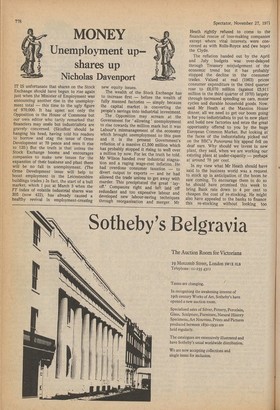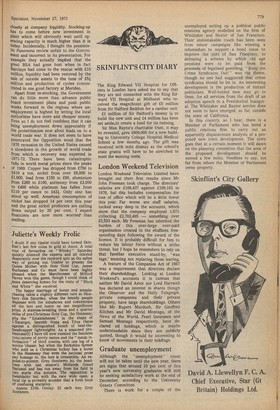MONEY
Unemployment up shares up
Nicholas Davenport
IT IS unfortunate that shares on the Stock Exchange should have begun to rise again just when the Minister of Employment was announcing another rise in the unemployment total — this time to the ugly figure of 970,000. It has upset not only the Opposition in the House of Commons but our own editor who tartly remarked that financiers may smile but industrialists are gravely concerned. (Skinflint should be hanging his head, having told his readers to borrow and stag the issue of Orme Development at 70 pence and seen it rise to 120.) But the truth is that unless the Stock Exchange booms and encourages companies to make new issues for the expansion of their business and plant there will be no fall in unemployment. (The Orme Development issue will help to boost employment in the Leicestershire buildings trades.) In fact, the start of a bull market, which I put at March 3 when the FT index of volatile 'industrial shares was 305 (now 422), has already caused a healthy revival in employment-creating new equity issues.
The wealth of •the Stock Exchange has to 'increase first — before the wealth of fully manned factories — simply because the capital market is converting the people's savings into industrial investment.
The Opposition may scream at the Government for ' allowing ' unemployment to rise towards the million mark but it was Labour's mismanagement of the economy which brought unemployment to this pass and it is the present Government's reflation of a massive £1,500 million which has probably stopped it rising to well over a million by now. For let the truth be told. Mr Wilson handed over industrial stagnation and a raging wage-cost inflation. He had overdone consumer taxation — to divert output to exports — and he had allowed the trade unions to get away with murder. This precipitated the great 'layoff.' Companies right and left laid off redundant and too expensive labour and developed new labour-saving techniques through reorganisation and merger. Mr Heath rightly refused to come to the financial rescue of loss-making companies except where vital interests were concerned as with Rolls-Royce and (we hope) the Clyde.
The reflation handed out by the April and July budgets was over-delayed through Treasury misjudgement of the economic trend but it has probably stopped the decline in the consumer trades. Valued at real (1963) prices consumer expenditure in the third quarter rose to £6,070 million (against £5,911 million in the third quarter of 1970) largely through increased spending on cars, motor cycles and durable household goods. Now, said Mr Heath at the Mansion House dinner, all we need to get our boom going is for you industrialists to put in new plant and build new factories and seize the great opportunity offered to you by the huge European Common Market. But looking at the faces of the industrialists picked out on the BBC's Panorama his appeal fell on deaf ears. Why should we invest in new plant, they said, when we are working our existing plant at under-capacity — perhaps at around 70 per cent.
In my view what Mr Heath should have said to the business world was a request to stock up in anticipation of the boom he saw coming. To encourage them to do so he should have promised this week to bring Bank rate down to 4 per cent to cheapen the cost of re-stocking. He might also have appealed to the banks to finance this re-stocking without looking too closely at company liquidity. Stocking-up has to come before new investment in Plant which will obviously wait until operating capacity is much higher than it is today. Incidentally, I thought the pessimistic Panorama review unfair to the Government and incorrect in its presentation. For example they actually implied that the great BSA had gone bust when in fact Barclays had come to the rescue with £10 million, liquidity had been restored by the sale of outside assets to the tune of £54 million and production of cycles concentrated in one good factory at Meriden.
Apart from re-stocking, the Government can do little more than advance public board investment plans and push public works forward in the regions where unemployment is highest by letting the local authorities have more and cheaper money. Even so I do not feel confident that It can bring unemployment down appreciably if the protectionism now afoot leads on to a world trade war. It does not seem to have Penetrated the Opposition mind that the 1970 recession in the United States caused a slowdown in the growth of world trade from which a recovery was expected in 1971-72. There have been catastrophic falls in world metal prices since the peaks of 1969. Copper has dropped from £750 to £410 a ton, nickel from over £6,000 to £1,000, lead from £150 to £90, aluminium from £260 to £160, antimony from £3,000 to £400 while platinum has fallen from £110 per ounce to £424. Only zinc has stood up well. American consumption of nickel has dropped 14 per cent this year and the great nickel producers are .cutting down output by 20 per cent. I expect financiers are now more worried' than smiling.















































 Previous page
Previous page